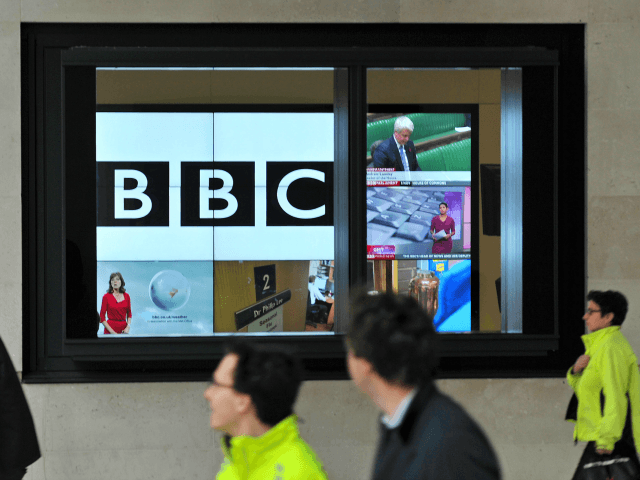China’s Global Times government propaganda newspaper dismissed the BBC as a “rumor mill” that had threatened China’s “national security” in a justification of the Communist Party banning the global broadcaster.
The Party removed BBC, which typically broadcasts left-of-center content, from Chinese airwaves – and in Hong Kong, where China has illegally usurped local authority – after the publication of a graphic report detailing extensive torture, including systematic rape, of individuals trapped in China’s western concentration camp system. Survivors told the BBC that guards would bring men into the camps every night to rape Uyghur and other Muslim ethnic minority women; many who experienced rape were also sexually assaulted with electric torture devices.
Chinese officials have denied the report and claimed that all those testifying of abuses are hired actors and assorted criminals, without providing any evidence for these claims. China has openly admitted to building and maintaining concentration camps for Uyghurs and other ethnic minorities, but refers to them as “vocational training centers” and claims they are part of a larger social program to boost the economy in the nation’s west.
The move to ban the BBC initially appeared to be a response to the United Kingdom revoking the broadcast license of China Global Television Network (CGTN), a Communist Party propaganda network. China’s broadcast regulatory authority had not mentioned the CGTN incident in its statement on BBC’s removal. Instead, officials said in a statement that the BBC “fails to meet the requirements to broadcast in China as an overseas channel.” The ban will remain in place for at least one year.
Hong Kong authorities similarly announced that the BBC would be ineligible to broadcast in the former British colony. While the official statements from Chinese officials did not mention reporting on the Uyghur genocide, China’s National Radio and Television Administration independently condemned the reporting as having “infringed the principles of truthfulness and impartiality in journalism.”
The Global Times made clear on Friday that BBC’s persistent coverage of human rights abuses in China was the primary reason for preventing people within Chinese borders from accessing it.
“China has sent the outside world a clear signal that it has zero tolerance for fake news Friday by barring BBC World News from airing in China. The decision comes as no surprise,” the Global Times declared. “For quite a while, BBC has been no longer a news organization that upholds objective reporting, but has degraded into a rumor mill with no bottom line.”
The BBC is now “paying the price for what it has done,” the outlet declared ominously.
The Global Times went on to specifically condemn the BBC for its extensive report, including multiple on-the-record sources, detailing abuses in China’s concentration camps. Among its complaints about the report was the fact that some of the women speaking to the BBC had previously spoken to other media outlets about their experience. While American government sources estimate that, at their peak, China’s concentration camps in the Xinjiang region held as many as 3 million people, few have managed to escape. Most of those who have both escaped and been willing to testify in public – a small group of people – either have ties to foreign governments like Kazakhstan or are married to foreign nationals, giving them the connections to escape.
“The same interviewees have appeared in almost every round of smear campaigns,” the Global Times protested on Friday, somehow proving that the BBC report was false.
“BBC is carrying out a public opinion crusade against China,” the newspaper concluded, “threatening China’s national security with false reports.” It affirmed that banning Chinese people from access to the network “has nothing to do with freedom of the press.”
The offending BBC report featured testimony from multiple named women who said they had endured torture in Xinjiang concentration camps and several anonymous reports, including testimony from a man who claimed to be a guard at one of the camps.
Tursunay Ziawudun, one of the women who shared her story, described the nightly use of rape to torture women.
“The woman took me to the room next to where the other girl had been taken in. They had an electric stick, I didn’t know what it was, and it was pushed inside my genital tract, torturing me with an electric shock,” she told BBC. “They don’t only rape but also bite all over your body, you don’t know if they are human or animal … They didn’t spare any part of the body, they bit everywhere leaving horrible marks. It was disgusting to look at.”
Another woman, an Uzbek woman identifying herself as Qelbinur Sedik, described rape as a “culture” in the camps.
“It is gang rape and the Chinese police not only rape them but also electrocute them. They are subject to horrific torture,’” she said.
The Chinese government responded to the report by denying the entirety of it and accusing everyone quoted in it of being a paid actor.

COMMENTS
Please let us know if you're having issues with commenting.